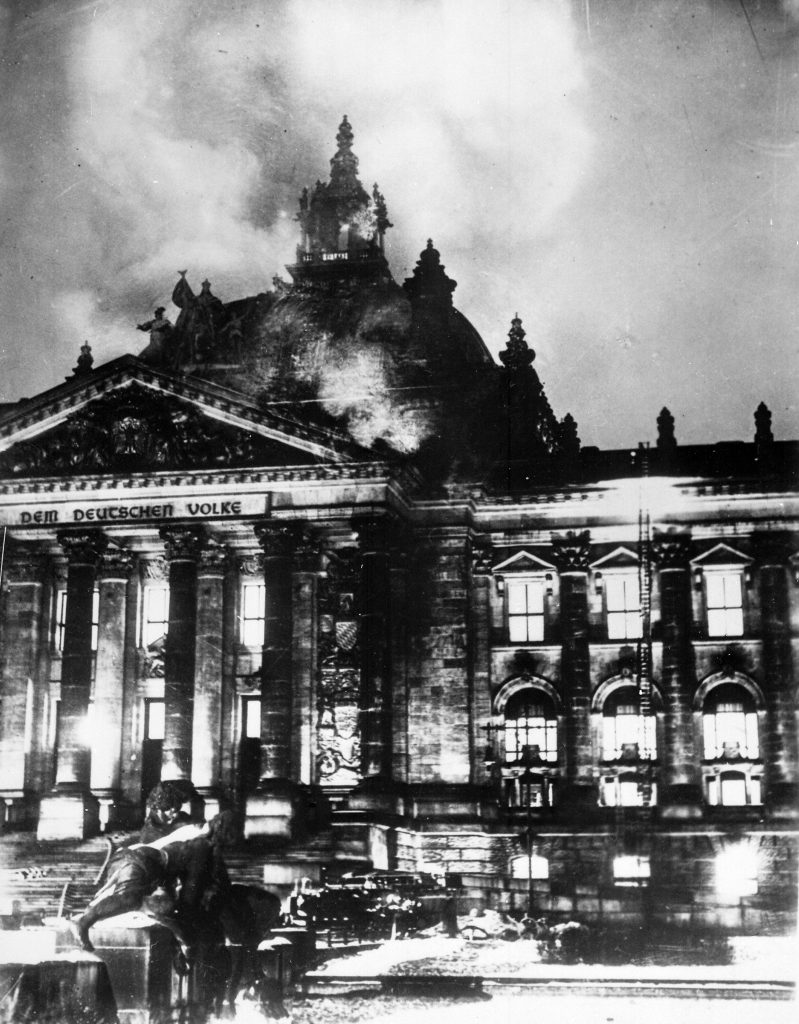“This is a God-given signal! If this fire, as I believe, turns out to be the handiwork of Communists, then there is nothing that shall stop us now crushing out the murder pest with an iron fist.” So allegedly expressed Adolf Hitler to Sefton Delmer, British journalist and Berlin correspondent for the Daily Express, one day after arsonists razed the Reichstag, Germany’s federal parliament building, on 27 February 1933.
Though he had yet to complete his first full month as chancellor in the still functioning Weimar Republic, Hitler seized upon the crisis for his own political gain. The Völkischer Beobachter, the Nazi Party’s official newspaper, propagated the false allegation that communists were planning to overthrow the legally-appointed government.
Historians have never discovered any credible evidence that supports this claim. Many German citizens at the time, however, believed the Nazis’ charge, including several news agencies in the United States. The New York Times reported on 13 September 1933, for instance, that a German commission discovered “a coup in the hands of a Russian Jew named Wollenberg … was prepared so that at a given signal the Red rising would break loose everywhere.” Germany did not release any specific information, however, “so as not to anticipate the court trial.”

As the Reichstag still smoldered, Nazi representatives, together with a sizable cadre of center-right politicians in the German National People’s Party (DNVP) and Center Party, passed the so-called “Reichstag Fire Decree” on 28 February 1933. Article 1 formally suspended “Articles 114, 115, 117, 118, 123, 124, and 153 of the Constitution,” an action that enabled the government “to restrict the rights of personal freedom, freedom of expression, including the freedom of the press, the freedom to organize and assemble, [and] the privacy of postal, telegraphic and telephonic communications.”
Article 4, meanwhile, targeted anyone whom the Nazis deemed a potential enemy of the state. “Whoever provokes, or appeals for, or incites the disobedience of the orders given out by the supreme state authorities … or order given by the Reich Government,” decreed the new legislation, “is punishable—insofar as the deed is not covered by other decrees with more severe punishments—with imprisonment of not less than one month, or with a fine of 150 up to 15,000 Reichsmarks.”
The same Article continued that “Whoever endangers human life by violating Article 1 is to be punished by sentence to a penitentiary … with imprisonment of not less than six months. … In addition, the sentence may include [the] confiscation of property. Whoever provokes or incites an act contrary to public welfare is to be punished … with imprisonment of not less than three months.”
Hitler’s fire decree effectively served as his first step toward civil dictatorship. Less than one month later, the last political remnants of Germany’s republic passed the “Enabling Act,” which authorized the Nazis to declare laws outside of the traditional constitutional framework. The last remnants of democracy, in effect, voted themselves out of existence. Germany’s elected body, now under the leadership of Hermann Göring, Hitler’s future second-in-command, simply authorized legislation at his convivence. It was the beginning of a long and dark period in German history, a catastrophe that eventually enveloped all of Europe six years later.
Serious historians recognize the importance of historical context and the necessity for evaluating the past on its own terms. At a time when high-profile media personalities invoke a skewed or blatantly false historical narrative to justify policies on a seemingly daily basis, I am wary of arguments that clumsily rely on unnuanced comparisons. Professional responsibility, however, does not abjure scholars the right to call attention to contemporary affronts to liberal democracy, from the forced separation of families at the U.S. southern border to officially-sanctioned violence against peaceful protestors in Lafayette Park in Washington, D.C and Portland, Oregon.
One does not need a Ph.D. in German history to recognize the dangerous potentials of our present-day politics in the United States. We can no longer comfort ourselves in a false logic that regards discriminatory practices as a unique aspect of German history or the distant past. History does not repeat itself. But a critical evaluation of past events can at least provide us means to learn about the destructive capabilities of nationalism, racism, and centralized oppression of citizens peacefully exercising their constitutional rights.
As George Orwell reminds us, “Power is not a means; it is an end. One does not establish a dictatorship in order to safeguard a revolution; one makes the revolution in order to establish a dictatorship. The object of persecution is persecution. The object of torture is torture. The object of power is power.” Trump is not Hitler and Trumpism is not Nazism. But any systematic government reliance on secret police and fabricated revolutions will not have a happy ending.
Dr. Adam A. Blackler is an assistant professor of history at the University of Wyoming. His book manuscript, currently titled An Imperial Homeland: Forging German Identity in Southwest Africa, explores the transnational dimensions of German colonialism, race, and genocide in German Southwest Africa (present-day Namibia). In September 2020, Peter Lang Press will publish his co-edited volume, entitled After the Imperialist Imagination: Two Decades of Research on Global Germany and Its Legacies, that analyzes the critical role of empire in modern German history between 1884 and the present-day. He will also publish a chapter, entitled “The Consequences of Genocide in the Long Nineteenth Century,” in Bloomsbury Press’s forthcoming series, A Cultural History of Genocide, which is scheduled for release in October 2020.

Comments 1
Jaki Kennedy — July 30, 2020
I could not agree more. As a serious student of the Holocaust, I have watched this administration following a path eerily similiar to that of Germany 1933-1935. The Enabling Act and the Nuremburg Laws were the foundation that helped make it possible.